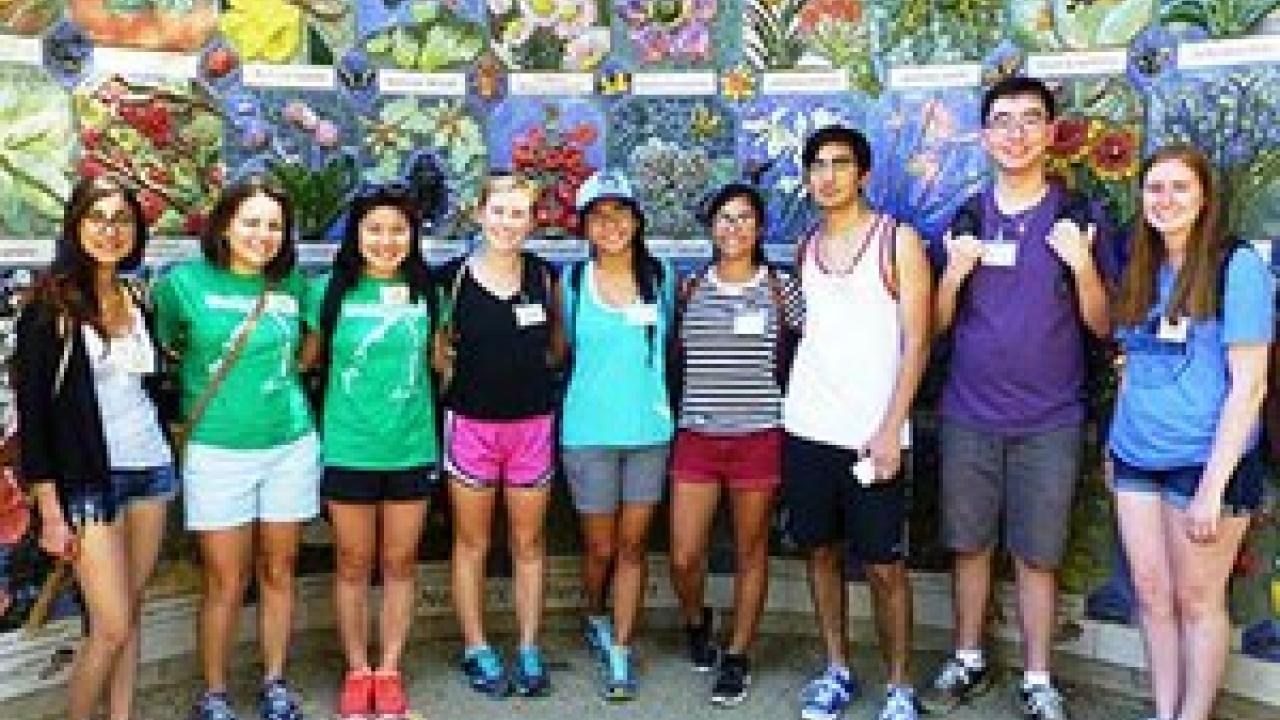
June 11, 2015
A Message from Dean Helene Dillard: Pollinators and honey bees get well-deserved attention
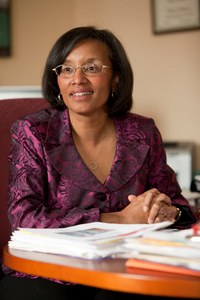 The federal government recently announced a far-reaching plan to promote the health of honey bees and other pollinators. It has three primary goals: dramatically reduce honey bee colony losses, increase the population of monarch butterflies, and increase pollinator habitat acreage by 7 million acres. This is welcome news for an issue that we are well aware of here in California, with our state’s heavy dependence on honey bees and pollinators to sustain production of many of our fruits, nuts, and vegetables.
The federal government recently announced a far-reaching plan to promote the health of honey bees and other pollinators. It has three primary goals: dramatically reduce honey bee colony losses, increase the population of monarch butterflies, and increase pollinator habitat acreage by 7 million acres. This is welcome news for an issue that we are well aware of here in California, with our state’s heavy dependence on honey bees and pollinators to sustain production of many of our fruits, nuts, and vegetables.
UC Davis has long been a world leader in research, extension, and education in the realm of honey bees and native pollinators. As Michael Parrella, chair of the Department of Entomology and Nematology, told the “Keeping Bees Healthy” symposium on May 9, “We’ve been doing honey bee research way before it became popular.”
Our programs in this field go back decades. Harry Laidlaw, a pioneer in honey bee genetics, led campus efforts to build what is to this day the largest stand-alone bee research facility in the United States. Other scientists such as Norm Gary, Robbin Thorp, Christine Peng, Robert Page, and Eric Mussen have kept UC Davis at the forefront of work on honey bees and native pollinators.
Today, a new generation of researchers and educators has picked up the mantle. Within the last year we hired Elina Niño as a Cooperative Extension specialist to continue the outstanding program that Eric Mussen built. Her honey bee laboratory is dedicated to supporting the state’s beekeepers through a program of basic and applied research and sharing information through extension and outreach. She advised the 360 beekeepers and others attending the symposium on best management practices to support honey bee health. Colony losses nationally have been as high as 40 percent in recent years, caused by multiple stressors such as diseases and parasites, exposure to pesticides, and lack of sufficient nutrition. Niño says beekeepers are trying to keep track of what’s going on in their colonies and are implementing integrated pest management strategies.
Honey bees and native pollinators need diverse pollen sources and that is where the work of entomology professor Neal Williams comes in. Part of his research focuses on the interplay between these two groups and figuring out ways to help both. Williams says the irony of intensive agriculture is that’s where the need is greatest, yet “clean” farming practices have removed a lot of vegetation that could help sustain pollinators. An emerging strategy he is studying is to enhance floral diversity through the use of pollinator meadows and wildflower strips planted adjacent to row crop agriculture. The twin goals of this work are to support forage habitat for honey bee and wild bee populations and to enhance pollination services to crops within agricultural landscapes. He and colleagues have developed recommended mixes of drought tolerant California native plants that can do the job.
And then there’s our Häagen-Dazs Honey Bee Haven, managed by Christine Casey. If you haven’t visited this educational oasis west of campus, plan a visit. Built with the support of the ice cream maker and others, it is located next to the Harry H. Laidlaw, Jr. Honey Bee Research Facility on Bee Biology Road and is open year-round. The garden has 260 different plant species that provide forage for bees and pollinators. Its primary mission is to educate and inspire urban gardeners about bees and pollinator-friendly plant selections. The garden design was based on a competition. It attracts hundreds of people every year, including K-12 schoolchildren, youth groups, and UC Davis students participating in classes and internships. You can keep on top of developments at Häagen-Dazs Honey Bee Haven on its Facebook page.
There’s much more going on at UC Davis in the world of bees and pollinators and we in the college remain committed to supporting this vital area of research, education, and outreach. Pollination services provided by honey bees and native pollinators are worth billions of dollars annually and help ensure our abundant and diverse food supply. We all have an interest in the well-being of these wild and managed insects and the work they do. I think about that every time I walk down the produce aisle.
Helene R. Dillard,
Dean
College of Agricultural and Environmental Sciences
hrdillard@ucdavis.edu
Who
Arboretum Ambassadors acknowledged for community service
UC Davis Arboretum Ambassadors recently won a gold level Community Service Award from the UC Davis Community Service Resource Center and a silver level President's Volunteer Service Award from President Barack Obama.
The Arboretum Ambassadors, environmental leadership interns who work in the UC Davis Arboretum and Public Garden, have provided accessible, free educational outreach programs to the public and K-12 audiences since 2008. The ambassadors work as a team to design participatory learning experiences that engage the broader community and improve environmental awareness. They have conducted community service through Picnic Day, many large-scale planting days, multiple plant sales, and a wide variety of educational events that typically attract 50 to 100 participants each. They invite many nontraditional learners and families to campus and provide high-quality educational experiences that inspire and educate.
Arboretum Ambassadors have a unique team structure that celebrates leadership and creativity. Each student commits for a year-long internship with professional staff training in ecology, event planning, fundraising, and educational program design. At the end of the year, they receive networking and mentorship resources from ambassador alumni who have gone on to pursue careers in the sciences, arts, and education.
Elaine Fingerett
UC Davis Arboretum and Public Garden
530-754-5686
efingerett@ucdavis.edu
Amanda Crump honored by the Association for International Agriculture and Rural Development
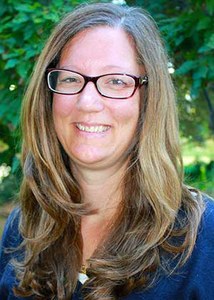 Amanda Crump, associate director of the Horticulture Innovation Lab, has received the Award for Distinguished Service from the Association for International Agriculture and Rural Development (AIARD) in Washington, D.C.
Amanda Crump, associate director of the Horticulture Innovation Lab, has received the Award for Distinguished Service from the Association for International Agriculture and Rural Development (AIARD) in Washington, D.C.
The award honors public service that improves global capacity to eliminate poverty, improve food security, conserve the environment, and stimulate economic growth. As the associate director for the Horticulture Innovation Lab, Crump leads the program’s gender equity focus and is responsible for monitoring a portfolio of research projects. Her research focuses on novel practices for agricultural extension education for farmers — particularly women — in developing countries. She also serves as the secretary-treasurer of AIARD and leads the UC Davis portion of a multi-university program focused on integrating gender and nutrition into agricultural extension services in several countries.
The Horticulture Innovation Lab at UC Davis focuses on fruit and vegetable research to help reduce poverty and improve nutrition around the world.
Amanda Crump
Horticulture Innovation Lab
Department of Plant Sciences
530-752-7975
acrump@ucdavis.edu
Melissa Whaley and Ed DePeters selected for Eleanor and Harry Walker Advising Awards
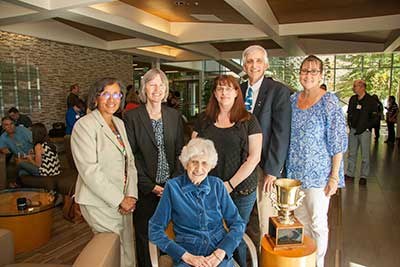
- Celebration of Advising Excellence – Staff adviser Melissa Whaley and Professor Ed DePeters received the Eleanor and Harry Walker Advising Award at a campus reception May 26. In photo from left to right are Dean Helene Dillard, Associate Dean Sue Ebeler, Eleanor Walker (seated), Melissa Whaley, Ed DePeters, and the Walkers’ daughter, Laurie Walker-Whiteland.
Environmental science and policy staff adviser Melissa Whaley and professor Ed DePeters are the 2015 recipients of the Eleanor and Harry Walker Advising Award. They were honored at a campus reception May 26.
The award supports and recognizes excellence in advising in the College of Agricultural and Environmental Sciences. Although the staff award has been given for many years, this is the first year the award has also been given to a faculty adviser. Whaley is the staff adviser in the environmental policy analysis and planning (EPAP) major, and is co-adviser for the environmental science and management (ESM) major.
Whaley is known for being proactive in reaching and retaining students and works hard to increase connections between faculty advisers in her department and current students and alumni. She coordinates an annual career event for ESM majors that provides opportunities for students to meet with alumni and student-selected professionals.
DePeters is a professor in animal science and serves as the master adviser for the animal science major. Students cite his positive influence on their lives. He developed an annual advising training program for faculty advisers and guides new faculty in developing their advising skills. He also manages the Animal Science Advising Center.
The late Harry O. Walker was a professor in the Department of Land, Air, and Water Resources for more than 40 years. He was a strong supporter of advising and served as a master adviser for undergraduate students. Walker once said, “One of my areas of interest is natural resources, and young people with active minds are our most important ‘natural resources.’ We as a community have an opportunity, as well as a responsibility, to maximize the capabilities of these individuals.”
Melissa Whaley
Department of Environmental Science and Policy
530-752-7183
mmwhaley@ucdavis.edu
Ed DePeters
Department of Animal Science
530-752-1263
ejdepeters@ucdavis.edu
What
Campus updates online events calendar
UC Davis has a new and improved online calendar. The calendar, developed by the Office of Strategic Communications, launched in May.
The calendar is designed to be the most complete listing of what’s happening at UC Davis — from seminars and conferences, and arts and athletic events, to fairs, expos, and exhibits. The calendar includes images and logos, map links (for venues), search and filter tools, and “Add to calendar” and “Forward to friends” buttons. Open an event and more options, such as email and text reminders, are available. Event planners can use it as a registration tool. Every event includes sharing tools for social media. Users can subscribe to automatic feeds for all events that fit personal criteria.
The Trumba-based calendar system can be customized. A department, for example, can gather all of its events from the main calendar, and embed them as a calendar on a department website. This way, department personnel are inputting each event only once and displaying it in multiple locations.
The calendar will eventually be open to all UC Davis departments and units. Departments and units will enter their own events, which are then routed to designated calendar administrators in the colleges, schools, and administrative units for approval and posting.
Visit the new online calendar. To learn more, read this article from Strategic Communications.
Charleen Floyd
CA&ES Dean’s Office
530-752-2120
msfloyd@ucdavis.edu
Arboretum and Public Garden events
For more information, visit the arboretum website: http://arboretum.ucdavis.edu.
Folk Music Jam Session
Friday, June 19, noon–1 p.m., Wyatt Deck
Folk musicians are invited to bring their acoustic instruments and play together informally over the lunch hour. All skill levels are welcome, and listeners are invited.
Camp Shakespeare
Session One (ages 8–12): July 6–17, Monday–Friday; Session Two (ages 8–12): July 20–31, Monday–Friday
The Davis Shakespeare Ensemble and the arboretum invite campers to participate in Camp Shakespeare for exciting theater games, acting workshops, and a special camp production. This summer campers will play pirates, clowns, and long-lost twins in one of Shakespeare’s best comedies, Twelfth Night. For more details and online enrollment, visit www.shakespearedavis.com.
When
Sensory Evaluation of Olive Oil I and II: June 15–16, June 17–19
The UC Davis Olive Center will hold its “Sensory Evaluation of Olive Oil” short courses June 15–16 and June 17–19 at the Robert Mondavi Institute (RMI).
The sensory courses are for the professional buyer, importer, category manager, producer, or anyone who wants to gain expertise in evaluating olive oil. Sensory, culinary, chemistry, and policy experts guide course participants through a unique tasting and educational experience.
The first course is designed for the beginning or experienced taster. Attendees will receive a booklet with presentations, and a flash drive with presentations and supplemental materials. Forty oils will be evaluated for attributes and common defects. Other topics include understanding standards, how harvest and processing affect quality, and state-of-the-art uses in the kitchen.
In the level-two course, participants will evaluate more than 60 oils. They will get trained as an olive oil sensory panel member would and learn advanced sensory principles. Other topics include understanding award-winning olive oils, advanced food pairings, and olive oil blending. Those who complete both courses will receive a master certificate.
Sensory Evaluation of Olive Oil will be conducted in the Silverado Vineyard Sensory Theater at the RMI. The course includes breakfast pastries, local coffee, and lunch featuring seasonal ingredients. Registration is $625 for the first course, and $925 for the second course. To learn more and register.
Dan Flynn
UC Davis Olive Center
530-752-5170
jdflynn@ucdavis.edu
Postharvest Technology of Horticultural Crops Short Course: June 15–26, 2015
The 37th annual Postharvest Technology of Horticultural Crops Short Course will be held June 15–26 at the UC Davis Activities and Recreation Center.
The course, organized by the UC Davis Postharvest Technology Center, is an intensive study of the biology and current technologies used for handling fruits, nuts, vegetables, and ornamentals in California. It is designed for research and extension workers, quality control personnel in the produce industry, and business, government, and academic professionals interested in current advances in the postharvest technology of horticultural crops. The course will be of particular interest to technical professionals responsible for quality assurance, research, and extension activities related to fresh produce quality, safety, and marketability.
The two-week lecture and field trip option is limited to 55 participants; the registration fee is $2,995. A one-week lecture-only option is limited to 25 participants; the registration fee is $1,975. To learn more and to register.
Penny Stockdale
UC Davis Postharvest Technology Center
530-752-7672
pastockdale@ucdavis.edu
Irrigation workshop in San Jose for landscape professionals: June 17, 2015
The California Department of Water Resources has partnered with the California Center for Urban Horticulture (CCUH) at UC Davis to hold a workshop June 17 in San Jose to help landscape professionals learn how to use water more efficiently.
The workshop will be held from 7 a.m. to noon at the San Jose Masonic Center. It will feature indoor presentations and outdoor demonstrations. Additional materials will be provided to all attendees after the event.
Similar workshops for landscape professionals were held earlier this year in Stockton and South Lake Tahoe, and last year in 11 locations throughout California.
The $20 registration fee includes an attendance certificate that can be used to obtain continuing education units. To register.
Dave Fujino
California Center for Urban Horticulture
530-754-7739
dwfujino@ucdavis.edu
Weed Day: July 16, 2015
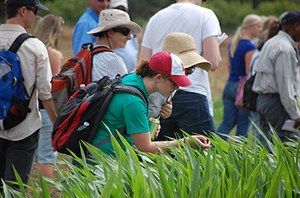 The 59th annual Weed Day will be held Thursday, July 16, from 7:30 a.m. to 4:30 p.m., beginning on campus at the Buehler Alumni Center and subsequently heading out for a field tour. Weed Day gives pest control advisers, UC farm advisors, chemical company cooperators, faculty, students, and regulatory officials the opportunity to learn more about current weed science research at UC Davis.
The 59th annual Weed Day will be held Thursday, July 16, from 7:30 a.m. to 4:30 p.m., beginning on campus at the Buehler Alumni Center and subsequently heading out for a field tour. Weed Day gives pest control advisers, UC farm advisors, chemical company cooperators, faculty, students, and regulatory officials the opportunity to learn more about current weed science research at UC Davis.
The morning field tour will include herbicide research in annual fruit and vegetable crops, crop safety and herbicide symptomology demonstrations, aquatic weeds research, grassland weed invasion and restoration research, and a weed identification challenge. Lunch and afternoon presentations will be indoors in the Buehler Alumni Center. UC staff and students will present information on projects that are not in season or are located off campus.
For more details and to register, visit http://wric.ucdavis.edu and click on Weed Day 2015.
Gale Pérez
UC Weed Research and Information Center
530-752-1748
gperez@ucdavis.edu
Weed Science School: August 18–20, 2015
Weed Science School takes place August 18–20 at the Bowley Plant Science Teaching Center. This intensive course focuses on the mode and mechanism of herbicide activity in plants and the fate of herbicides in the environment.
The school is designed for those involved in consulting, research, development, or sales of agricultural chemicals in either the private or public sector and provides a rare opportunity for professionals to efficiently update their understanding of weed science and the action of herbicides in the plant and in the environment. Emphasis is on herbicides registered for use in California and important weeds within the state.
Early registration is $675 until July 18; $775 thereafter. In addition, a discounted registration of $375 is available for two UC farm advisors and two current students. Registration and agenda information.
Gale Pérez
UC Weed Research and Information Center
530-752-1748
gperez@ucdavis.edu
International Conference on Fresh-cut Produce — Maintaining Quality and Safety: September 13–18, 2015
Registrations are being accepted for the third International Conference on Fresh-cut Produce — Maintaining Quality and Safety. The conference will be held on the UC Davis campus, September 13–16, with an optional two-day technical tour, September 17–18. Conference attendance is limited to 200 registrants.
The conference is organized by UC Cooperative Extension specialist Marita Cantwell under the aegis of the International Society for Horticultural Science. General topics include quality and product development, temperature and handling logistics, preparation and processing, packaging and modified atmospheres, food safety and sanitation, and marketing and consumer acceptance. An industry–academia panel also is planned, focusing on future industry needs and emerging technologies in fresh-cut products.
Register and learn more. The conference will take the place of the annual fresh-cut workshop in 2015.
Penny Stockdale
UC Davis Postharvest Technology Center
530-752-7672
pastockdale@ucdavis.edu
Produce Safety — a Science-based Framework Workshop: November 3–5, 2015
The UC Davis Postharvest Technology Center is offering a workshop, November 3–5, on developing a scientific framework for produce microbial safety systems and preventive controls. The course is designed primarily for entering and junior-level produce safety professionals and others with an interest in produce safety education.
Course content will provide participants with a basis for decision making on topics common to industry guidance standards, as well as federal regulatory compliance. The curriculum is a blend of fundamental, applied, and practical information. The course includes formal lectures, group assessments, and break-out groups. The curriculum includes the scientific basis for audit standards and preparing for using audits and targeted microbiological testing to improve performance.
The course will be held in the ballroom at the UC Davis Conference Center. Enrollment is $950 and includes instruction, course material, a networking reception, and two lunches. For additional information and to enroll, visit the course website. Enrollment is requested by October 23, 2015.
Penny Stockdale
Postharvest Technology Center
530-752-7672
pastockdale@ucdavis.edu
* * * * * * * * * * * * * *
Visit CA&ES Currents online at http://www.caes.ucdavis.edu/news/publications/currents.
CA&ES Currents, the faculty/staff newsletter of the College of Agricultural and Environmental Sciences at the University of California, Davis, is published monthly. Send news items to editor, jdstumbos@ucdavis.edu.
Editor: John Stumbos
Writing: Helene Dillard, John Stumbos
Editorial review: Ann Filmer, Julie Fritz-Rubert, Thomas Kaiser, Christine Schmidt
To be added to or deleted from this electronic newsletter list, please send an e-mail to: caeseditor@agdean.ucdavis.edu.
The University of California does not discriminate in any of its policies, procedures, or practices.
The university is an affirmative action/equal opportunity employer.